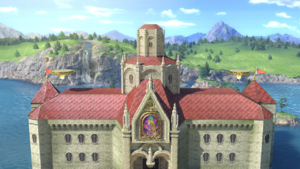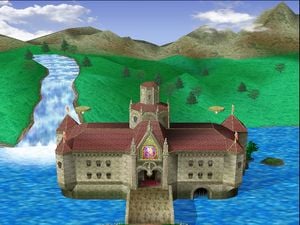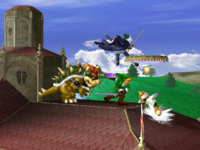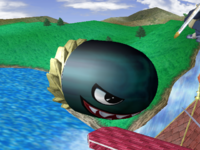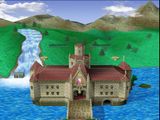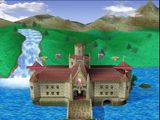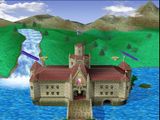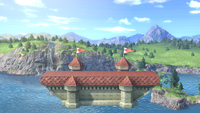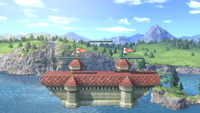Princess Peach's Castle: Difference between revisions
Tags: Reverted Mobile edit |
Aidanzapunk (talk | contribs) m (Undid edit by 98.50.154.28: please stop adding this back) Tag: Undo |
||
| Line 26: | Line 26: | ||
==Stage overview== | ==Stage overview== | ||
[[File:Peach's Castle Gameplay Melee.png|thumb|left|Gameplay in ''Melee''.]] | [[File:Peach's Castle Gameplay Melee.png|thumb|left|Gameplay in ''Melee''.]] | ||
The stage itself consists of two halves separated by a tower in the center. Near the edge of both halves is a small floating stand that rises when a character stands on it. The middle tower contains two layers; the bottom layer is a narrow, rising sloped area that can be used as a foothold to reach the top layer. The only way between the two halves of the stage is to pass over the entirety of the central tower; the edges of the stage are walls that travel all the way down to the bottom [[blast line]] at water level. Although [[swimming]] was introduced with ''Brawl'', fighters fall through the moat in the stage's ''Ultimate'' appearance rather than swimming in it. | The stage itself consists of two halves separated by a tower in the center. Near the edge of both halves is a small floating stand that rises when a character stands on it. The middle tower contains two layers; the bottom layer is a narrow, rising sloped area that can be used as a foothold to reach the top layer. The only way between the two halves of the stage is to pass over the entirety of the central tower; the edges of the stage are walls that travel all the way down to the bottom [[blast line]] at water level. Although [[swimming]] was introduced with ''Brawl'', fighters fall through the moat in the stage's ''Ultimate'' appearance rather than swimming in it. | ||
Revision as of 14:50, July 2, 2024
| Super Mario 64 Mushroom Kingdom: Princess Peach's Castle | |
|---|---|
Princess Peach's Castle as it appears in Smash. | |
| Universe | Mario |
| Appears in | Melee Ultimate |
| Availability | Starter |
| Crate type | Normal |
| Maximum players | 4 (Melee) 8 (Ultimate) |
| Article on Super Mario Wiki | Peach's Castle |
| “ | A returning stage from Super Smash Bros. Melee. Watch out for Banzai Bill to come flying out of nowhere and explode. There are also red, yellow[sic], and green switches you can press to make "!" Blocks appear. Try hitting them to get items! | ” |
| —Super Smash Blog, Super Smash Bros. Ultimate Official Site | ||
Announced at E3 2001, Princess Peach's Castle (ピーチ城, Peach Castle) is a stage in Super Smash Bros. Melee and Super Smash Bros. Ultimate. It is the roof of the castle as seen in Super Mario 64. In Melee's All-Star Mode, this stage is played on when the player faces Peach and any of her teammates. In Melee, Dr. Mario is fought here for his unlock battle, while in Ultimate, Peach is fought here for her unlock battle.
Stage overview
The stage itself consists of two halves separated by a tower in the center. Near the edge of both halves is a small floating stand that rises when a character stands on it. The middle tower contains two layers; the bottom layer is a narrow, rising sloped area that can be used as a foothold to reach the top layer. The only way between the two halves of the stage is to pass over the entirety of the central tower; the edges of the stage are walls that travel all the way down to the bottom blast line at water level. Although swimming was introduced with Brawl, fighters fall through the moat in the stage's Ultimate appearance rather than swimming in it.
Occasionally, switches will appear somewhere on the castle. These switches are pressure activated, and come in three different colors: red, blue, and green. When a switch is activated, some "!" Blocks and some platforms of the same color will appear somewhere on the castle, and it will also apply about a full second of freeze frames to whoever (or whatever) touched it. Two Red "!" Blocks can appear on either side of the castle roof, a sole Blue "!" Block can appear at the top of the castle, and two Green "!" Blocks can appear bunched together on the far left side of the castle, suspended in the air. If items are turned on, the blocks release items when one touches them in any manner.
Every one to five minutes, a large Banzai Bill will shoot from the side of the stage in the sky. This is first signaled by the sound of a cannon firing, and then the Banzai Bill will appear from a random side of the screen (including the top) and move in a slow straight path until it crashes into the castle. Approximately four seconds after contact with the castle, the Banzai Bill will explode, dealing around 30-45% damage with multiple hits with the last hit dealing very large knockback, resulting in a one-hit KO if a player is caught by all the hits. Aesthetically, fabrics (like Mario's Cape or the flags on the stage) will shake when the explosion occurs. It is possible to throw or hit an opponent into the explosion. Before it explodes, the Banzai Bill itself also does light damage and soft knockback if touched.
Platform layouts
Ω form and Battlefield form
In Super Smash Bros. Ultimate, the Ω form and Battlefield form are suspended in the air with the main platform no longer extending below the blast line. The main platform is completely flat and is the same size and shape as Final Destination and Battlefield, respectively. The colored switches, floating platforms, and Banzai Bill are absent. The main platform takes elements from Princess Peach's Castle, such as the roof being the floor and a gray brick structure as the walls. The three soft platforms of the Battlefield form are based on the soft platforms that appear when the green switch is activated in the regular form.
Hazards Off
With hazards off in Ultimate, the colored switches and Banzai Bills are absent, and the floating platforms on each side don't move when fighters stand on them.
Origin
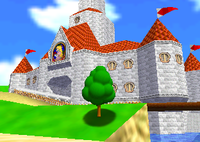
This stage is based on Peach's Castle, with its current design debuting in Super Mario 64, where it serves as the game's main hub and has appeared in numerous Mario titles since. The castle is surrounded by the castle grounds, which also features hills to prevent the player from escaping, trees, a waterfall, and a moat.
In Super Mario 64, the castle is taken over by Bowser, who takes control of the Power Stars and seals Princess Peach inside the fresco over the castle entrance. After Mario defeats Bowser and collects all of the game's Power Stars, the cannon in the castle grounds is unlocked, which will allow the player to access the roof of the castle, which hides Yoshi and three 1-Up Mushrooms.
This stage's design is based on the castle's appearance in Super Mario 64; however, the center top tower has been removed and the castle itself has been scaled down to size, along with the rooftop and castle walls having a very different color. Some other elements which surround both the original castle and this version feature the hills, the waterfall, and the moat; however, the castle has much more water surrounding it than in Super Mario 64.
The colored switches and the colored blocks in this stage are based on a combination of both Super Mario World's ! Switches and ! Blocks, which later reappeared in Super Mario 64; however, the "!" is removed from their designs. In Super Mario World the ! Switches can be located by accessing the hidden Switch Palaces. Pressing the ! Switches will make the color-coordinated ! Blocks appear in other levels, either to release items when hit or allow the player access to secret areas in the levels. The yellow ! Switches and ! Blocks that appeared in Super Mario World are absent in the stage; only the red, green and blue switches and ! Blocks appear in this stage, instead matching the three ! Switches from Super Mario 64. Unlike in Super Mario World and Super Mario 64, where the different colors contain exclusive power-ups, in the Super Smash Bros. series, the blocks contain random items, instead. The switches in this stage also do not have an exclamation point on them, and are much smaller than in Super Mario World and Super Mario 64.
Banzai Bills are larger versions of Bullet Bills that debuted in Super Mario World; however, they did not explode prior to the release of Melee. The Banzai Bill's design in Melee is completely original, which also features a rotor-like rear portion. In Ultimate, the front half of the Banzai Bill is changed to resembles its appearance since New Super Mario Bros., but it still keeps the rotor-like rear portion.
Tournament legality
While initially available in older Melee tournaments as a counterpick stage, the stage is currently banned. The stage's large permanent walls can allow for infinites, especially Shine infinites from Fox, and the Banzai Bills are deemed too disruptive for a fair competitive match. The walls can also promote camping, as they reduce how many angles players can attack each other. The stage is also banned in Ultimate for the same reasons, though the item spawns and Banzai Bills are removed when stage hazards are turned off.
Trophy

- Princess Peach's Castle
- Princess Peach's magnificent royal castle appears to be inhabited solely by the princess and a multitude of Toads. Bowser tried to steal the castle's Power Stars in Super Mario 64, and in Paper Mario, the surly archfiend actually lifted the castle into the stratosphere with his own filthy fortress.
- Super Mario 64 (9/96)
Gallery
Super Smash Bros. Melee
Super Smash Bros. Ultimate
Donkey Kong preparing to punch a Banzai Bill on the stage.
Ryu and Knuckle Joe on this stage.
Names in other languages
Trivia
- In Melee, whenever a Banzai Bill appears, the AI on this stage is programmed to flee to the opposite side of the stage and remain there until it explodes. Aside from making it relatively easy for a human player to corner the AI whenever this occurs, it is also possible for the fleeing action itself to cause the AI to jump into the explosion, resulting in an SD. This can occur if the Banzai Bill has randomly chosen to strike the center tower of the stage from above, and the AI is far away from the center at the time; despite the hazard attacking the center of the stage, the AI will still attempt to head for the other side of the stage, which naturally requires moving toward the center and passing right over the center tower.
- The Super Smash Blog mistakenly mentions yellow switches, which don't appear on the stage, instead of blue switches.
- The following Assist Trophies can only be summoned on the stage's Battlefield and Omega forms: Tiki, Kapp'n, Color TV-Game 15 (due to the spire interfering with the ball), Dr. Kawashima, Ghosts and Rathalos. The same also applies to Marshadow and the Timer item.
| Stages in Super Smash Bros. Melee | |
|---|---|
| Starter stages | Brinstar · Corneria · Fountain of Dreams · Great Bay · Green Greens · Icicle Mountain · Jungle Japes · Kongo Jungle · Mushroom Kingdom · Mute City · Onett · Pokémon Stadium · Princess Peach's Castle · Rainbow Cruise · Temple · Venom · Yoshi's Island · Yoshi's Story |
| Unlockable stages | Battlefield · Big Blue · Brinstar Depths · Final Destination · Flat Zone · Fourside · Mushroom Kingdom II · Poké Floats |
| Dream Land · Kongo Jungle · Yoshi's Island | |
